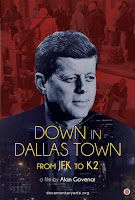the traveler's resource guide to festivals & films
a FestivalTravelNetwork.com site
part of Insider Media llc.
Film and the Arts
November '23 Digital Week III
- Details
- Parent Category: Film and the Arts
- Category: Reviews
- Published on Friday, 01 December 2023 02:46
- Written by Kevin Filipski
Film Festival Roundup—DOCNYC 2023
- Details
- Parent Category: Film and the Arts
- Category: Reviews
- Published on Monday, 20 November 2023 19:10
- Written by Kevin Filipski
 |
| Fanny—The Other Mendelssohn |
 |
| How to Come Alive With Norman Mailer |
 |
| Psychedelicized—The Electric Circus Story |
 |
| Rainbow Warrior |
 |
| Angel Applicant |
Comic Lizz Winstead created The Daily Show and cofounded the liberal radio network Air America, but she would probably say her greatest contribution is her pro-choice Abortion Access Front, which Ruth Leitman’s No One Asked You explores in meaningful and even amusing detail. Winstead and her cohorts have kept their sense of humor as well as their sense of proportion, and Leitman shows them using everything in their arsenal to ensure that, in the face of mounting defeats culminating in the overturn of Roe v. Wade, women—and not the (mainly) men in power—retain control over their own bodies.
 |
| The Trials of Alan Dershowitz |
Off-Broadway Play Review—“Scene Partners” with Dianne Wiest
- Details
- Parent Category: Film and the Arts
- Category: Reviews
- Published on Sunday, 19 November 2023 23:40
- Written by Kevin Filipski
 |
| Dianne Wiest and Josh Hamilton in Scene Partners (photo: Carol Rosegg) |
Juilliard Orchestra Present Finnish Classic
- Details
- Parent Category: Film and the Arts
- Category: Reviews
- Published on Friday, 17 November 2023 15:22
- Written by Jack Angstreich

Photo by Claudio Papapietro.
At Lincoln Center’s Alice Tully Hall, on the evening of Monday, November 6th, I had the exceptional pleasure to attend a terrific concert featuring the excellent Juilliard Orchestra, under the direction of Jeffrey Milarsky.
The program began impressively with a sterling account of the powerful, mysterious Lumière et Pesanteur by the late contemporary Finnish composer, Kaija Saariaho. In her note on the work, she commented:
Lumière et pesanteur is a gift for Esa-Pekka Salonen, inspired by his performance of my La Passion de Simone in Los Angeles, January 2009. This piece is an arrangement based on the eighth station of the Passion, which I know that he especially likes.
Program annotator Noémie Chemali adds:
This version is an arrangement without the electronics that, in the original oratorio, narrated [Simone] Weil's own texts. It was also pared down to the orchestral part without a soprano soloist; this time, the principal trumpet takes the role of the passion play’s narrator.
And about La Passion de Simone, she says:
this multimedia oratorio, created in collaboration with Lebanese-French writer Amin Maalouf and stage director Peter Sellars, premiered in 2006 at the New Crowned Hope Festival in Vienna. Written in the passion play tradition, it makes a loose allusion to Baroque oratorio, which historically depicts the suffering of Jesus. This work, instead, explores the life and spiritual journey of the iconic French philosopher and mystic Simone Weil (1909-43). Scored for orchestra, solo soprano, and electronics, it was subsequently performed by fellow Finn, conductor Esa-Pekka Salonen, who inspired the orchestral arrangement known asLumière et pesanteur.
A remarkable young cellist, Taeguk Mun, then joined the musicians as soloist for a memorable rendition of Ernest Bloch’s moving, neo-Romantic Schelomo, Hebraic Rhapsody from 1916, earning—and receiving—an enthusiastic ovation, but the second half of the event was maybe even more extraordinary, consisting of an enthralling version of the magnificent Symphony No. 3 of Johannes Brahms. The opening of the initial Allegro con brio is passionate in nature but much of the movement has a quasi-pastoral character—on the whole, the dominant mood is affirmative although not without darker undercurrents. The ensuingAndanteis more subdued but also joyous in general, notwithstanding the abiding tragic cast of the composer’s personality. The melodic and lyrical Poco allegretto is astonishingly beautiful—itshaunting main theme was employed by Serge Gainsbourg for his exquisite song, "Baby alone in Babylone,” which was sung in its immortal original recording by the fabulous Jane Birkin. The Allegro finale—the most dramatic and intense of the movements—is Mendelssohnian at moments. The artists were rewarded with ardent applause, a harbinger of what appears to be an exciting season.
More Articles...
Newsletter Sign Up
















